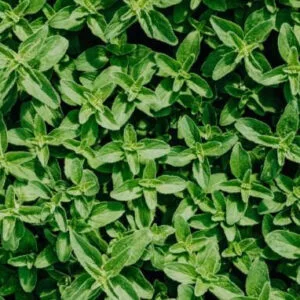Oregano Seeds (30 seeds)
Original price was: ₹70.0.₹35.0Current price is: ₹35.0.
Oregano is a plant from the mint family which is a signature flavor of many Italian, Mexican, and Spanish dishes. Rowing the Italian herb in our home garden is a delight for our culinary experience. Try our Non-GMO Seeds. Also, check out our workshops for more details.
PRODUCT DESCRIPTION
Number of seeds in a packet – 30
PLANT DESCRIPTION
- Difficulty Level – easy
- Plant Height – 1 – 2 feet
- Type – indoor (balcony/ terrace) or outdoor
- Aroma – strong balsamic
- Flavor – peppery pungent and bitter taste
- Feed – Vermicompost for nutrients every week, Seaweed once a month for greener leaves, and Epsom salt for better blooming once a month
- Watering – every day
- Sunlight – full sunlight
- Germination Time – 2 weeks
- Suitable Temperature – 60°F – 80°F
- Season – perennial
- Sowing – late Spring
HOW TO GROW OREGANO FROM SEEDS
- Take a Growbag and fill it with Cocopeat.
- Sprinkle the seeds around the Growbag.
- Fill the hole with Cocopeat lightly and spray with water.
- Water every day.
- Seeds will germinate within 2 weeks.
- Full sunlight is needed.
ALTERNATE METHOD
- Take a Medium Size Pot and add a Potting Mix.
- If planting in the soil adds Neem Cake Powder, Vermicompost, and Seaweed.
ALTERNATE NAME
Botanical name: Origanum vulgare
oregano seed in hindi: origaino ke beej (ओरिगैनो के बीज)
oregano seed in tamil: arkano vitai (ஆர்கனோ விதை)
oregano seed in telugu: oregano sid (ఒరేగానో సీడ్)
oregano seed in kannada: oregano bija (ಓರೆಗಾನೊ ಬೀಜ)
oregano seed in marathi: oregeno biyane (ओरेगॅनो बियाणे)
oregano seed in malayalam: oragaano vithu (ഓറഗാനോ വിത്ത്)
Other names: Marjoram
You must be logged in to post a review.
Q & A
Organic herbal seeds are typically considered a sustainable choice for several reasons. Here are some factors that contribute to their sustainability:
Environmental benefits: Organic farming methods used to cultivate herbal seeds prioritize the use of natural fertilizers, crop rotation, and biological pest control. These practices help maintain soil fertility, minimize soil erosion, and reduce water pollution. By avoiding synthetic pesticides and genetically modified organisms (GMOs), organic farming supports biodiversity and preserves ecosystem health.
Chemical-free production: Organic herbal seeds are grown without the use of synthetic pesticides, herbicides, or chemical fertilizers. This reduces the release of harmful substances into the environment, protects the health of farmers and workers, and minimizes the risk of chemical residues in the final product.
Non-GMO: Organic herbal seeds are non-GMO, meaning they are not genetically modified. GMO crops often have environmental and health concerns associated with them, such as the potential for increased pesticide use and the loss of genetic diversity. By choosing organic, non-GMO seeds, consumers can support sustainable agriculture and promote the preservation of traditional seed varieties.
Seed sovereignty: Organic herbal seeds contribute to seed sovereignty, which refers to the rights of farmers and communities to save, exchange, and develop their own seeds. Supporting organic seed production helps protect traditional knowledge, empowers farmers, and promotes agricultural resilience.
Health benefits: Organic herbal seeds are grown without synthetic chemicals, making them a healthier option for consumers. They are free from pesticide residues and may have higher nutrient content compared to conventionally grown seeds.
Local and small-scale agriculture: Organic herbal seed production often takes place on small-scale farms, supporting local economies and rural communities. By purchasing organic seeds from local producers, consumers can reduce their carbon footprint associated with transportation and support sustainable farming practices.
It's important to note that sustainability also depends on various factors beyond the organic nature of the seeds, such as transportation methods, packaging materials, and overall agricultural practices. To ensure the highest level of sustainability, it's beneficial to consider the entire lifecycle of the product, from seed to consumption.
General Inquiries
There are no inquiries yet.





Reviews
There are no reviews yet.